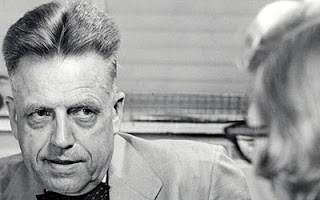 |
| Alfred Kinsey's studies were methodologically flawed |
We now know that when Alfred Kinsey reported on the sexual habits of Americans in the mid-20th century, his research was methodologically flawed.
In an attempt to gather more reliable data on the sexual habits of Americans, social scientists Robert T.
Michael, John H. Gagnon, and Edward O. Laumann initiated a comprehensive
study into the sexual habits of Americans in the early 90's. They commissioned a staff of
220 interviewers, stationed at the National Opinion Research Center at
the University of Chicago. Instead of relying on unrepresentative groups
of volunteers, as Kinsey had done, these researchers selected random
samples. Over a period of seven months, they interviewed 3,432
respondents and asked them questions about all aspects of their sex
lives.
Much of what their study uncovered was predictable, while some things
came as a surprise. The greatest shock of all concerned the relationship
between sexual pleasure and religious belief.
Using objectively verifiable criteria, the study found that the people who have the most
sex, the best sex, and are the happiest about their sex lives are
monogamous, married, religious people.
I have explored the implications of this in my recent Salvo feature. To read my article, click on the following link:
No comments:
Post a Comment